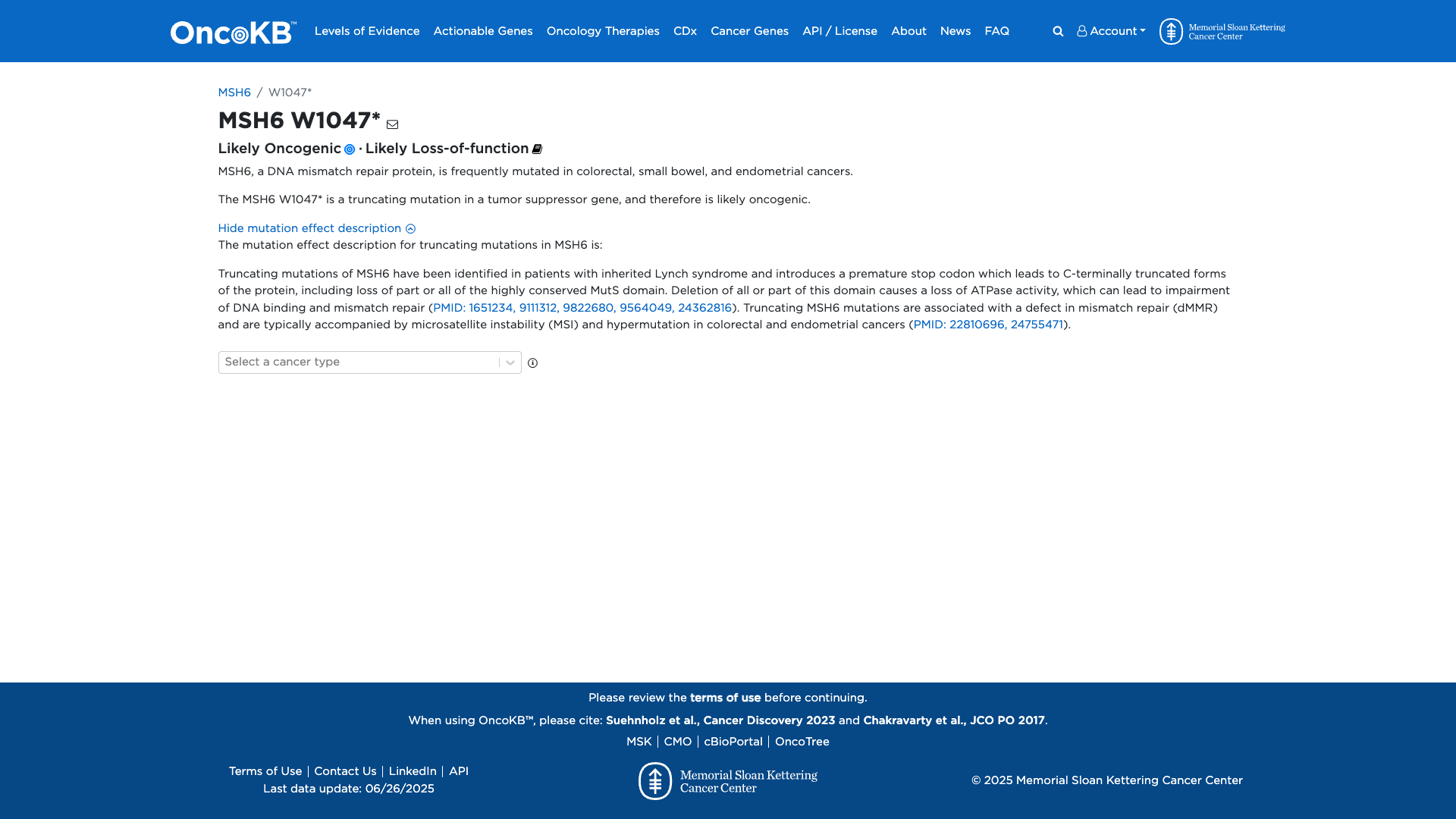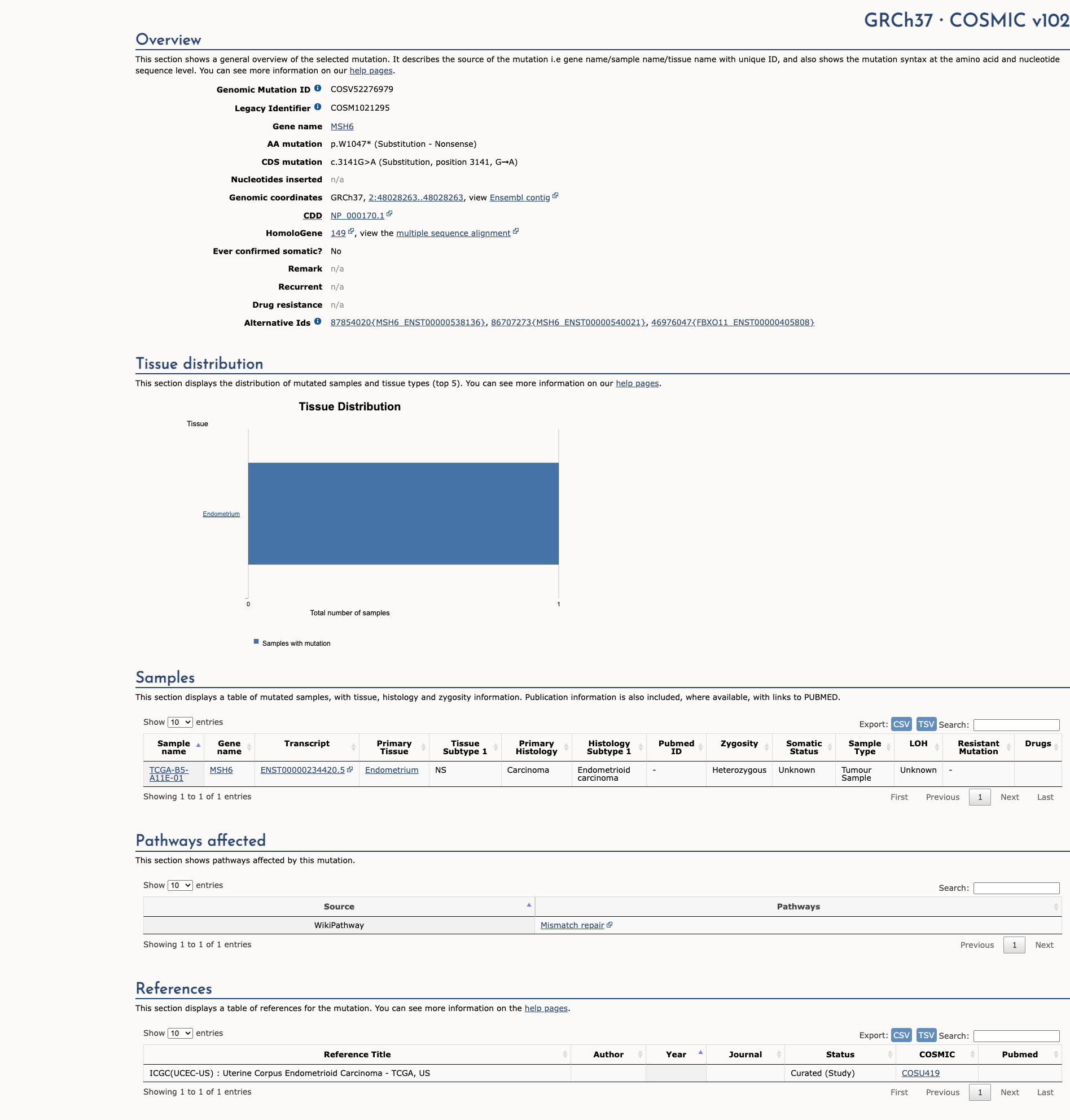MSH6 c.3141G>A, p.Trp1047Ter
NM_000179.3:c.3141G>A
COSMIC ID: COSM1021295
Pathogenic
This MSH6 nonsense variant W1047* introduces a PTC at codon 1047 (PVS1_Very Strong), demonstrates MMR functional defect (PS3_Moderate), is absent from population databases (PM2_Supporting), and is reported as pathogenic by multiple reputable sources (PP5_Supporting), meeting criteria for a Pathogenic classification.
ACMG/AMP Criteria Applied
PVS1
PS3
PM2
PP5
Genetic Information
Gene & Transcript Details
Gene
MSH6
Transcript
NM_000179.3
MANE Select
Total Exons
10
Strand
Forward (+)
Reference Sequence
NC_000002.11
Alternative Transcripts
| ID | Status | Details |
|---|---|---|
| NM_000179.2 | RefSeq Select | 10 exons | Forward |
| NM_000179.1 | Alternative | 10 exons | Forward |
Variant Details
HGVS Notation
NM_000179.3:c.3141G>A
Protein Change
W1047*
Location
Exon 4
(Exon 4 of 10)
5'Exon Structure (10 total)3'
Functional Consequence
Loss of Function
Related Variants
Alternate Identifiers
COSM1021295
Variant interpretation based on transcript NM_000179.3
Genome Browser
Loading genome browser...
HGVS InputNM_000179:c.3141G>A
Active Tracks
ConservationRefSeqClinVargnomAD
Navigation tips: Use mouse to drag and zoom. Click on features for details.
Clinical Data
Population Frequency
Global Frequency
0.0 in 100,000
Extremely Rare
Global: 0.0%
0%
0.05%
0.1%
1%
5%
10%+
ACMG Criteria Applied
PM2
This variant is not present in gnomAD (PM2 criteria applies).
Classification
2 publications
Pathogenic
Based on 4 submitter reviews in ClinVar
Submitter Breakdown
4 Path
Pathogenic
Likely Path.
VUS
Likely Benign
Benign
Publications (2)
The p.W1047* pathogenic mutation (also known as c.3141G>A), located in coding exon 4 of the MSH6 gene, results from a G to A substitution at nucleotide position 3141. This changes the amino acid from a tryptophan to a stop codon within coding exon 4. This alteration has been reported in a male diagnosed with colorectal cancer at age 38 and whose mother was diagnosed with colorectal cancer at age 48 (Chubb D et al. J. Clin. Oncol., 2015 Feb;33:426-32). In addition to the clinical data presented in the literature, this alteration is expected to result in loss of function by premature protein truncation or nonsense-mediated mRNA decay. As such, this alteration is interpreted as a disease-causing mutation.
For these reasons, this variant has been classified as Pathogenic. ClinVar contains an entry for this variant (Variation ID: 973403). This premature translational stop signal has been observed in individual(s) with colorectal cancer (PMID: 25559809). This variant is not present in population databases (gnomAD no frequency). This sequence change creates a premature translational stop signal (p.Trp1047*) in the MSH6 gene. It is expected to result in an absent or disrupted protein product. Loss-of-function variants in MSH6 are known to be pathogenic (PMID: 18269114, 24362816).
Clinical Statement
This variant has been reported in ClinVar as Pathogenic (4 clinical laboratories).
Functional Impact
Functional Domain
Hotspot Status
Not a hotspot
Domain Summary
This variant is not located in a mutational hotspot or critical domain (0 mutations).
Related Variants in This Domain
Functional Summary
The MSH6 W1047* variant is a truncating mutation that results in the loss of the ATPase domain, leading to a loss of MSH6 protein function. This loss of function impairs DNA mismatch repair, which is associated with microsatellite instability and hypermutation in cancers such as colorectal and endometrial cancer.
Database Previews
OncoKB

JAX-CKB

Click on previews to view full database entries. External databases may require institutional access.
Computational Analysis
Pathogenicity Predictions
Predictor Consensus
Mixed/VUS
PP3 Applied
No
Additional Predictors
Benign:
CADD: 9.77
Neutral: Show all
VCEP Guidelines
Applied ACMG/AMP Criteria (VCEP Specific) VCEP Guidelines
PVS1
PVS1 (Very Strong)
According to VCEP guidelines, the rule for PVS1 is: "Very Strong Strength: Very Strong Nonsense/frameshift variant introducing Premature Termination Codon (PTC) a ≤ codon 1341 in MSH6." The evidence for this variant shows a nonsense mutation at codon 1047 (W1047*), which introduces a PTC ≤ 1341 and is predicted to undergo NMD in MSH6 where loss of function is a known disease mechanism. Therefore, this criterion is applied at Very Strong strength because the variant introduces a PTC at codon 1047, meeting VCEP PVS1 criteria.
PS1
PS1 (Not Applied) Strength Modified
According to VCEP guidelines, the rule for PS1 is: "A predicted missense substitution that encodes the same amino acid change with a different underlying nucleotide change previously established by this VCEP as Pathogenic." The evidence for this variant shows a nonsense change (W1047*), not a missense substitution. Therefore, this criterion is not applied.
PS2
PS2 (Not Applied) Strength Modified
According to VCEP guidelines, the rule for PS2 is: "Very Strong ≥4 de novo points." The evidence for this variant shows no de novo segregation data. Therefore, this criterion is not applied.
PS3
PS3 (Moderate) Strength Modified
According to VCEP guidelines, the rule for PS3 is: "Moderate: MMR function defect following functional assay flowchart.*" The evidence for this variant shows loss of the ATPase domain and loss of mismatch repair function in vitro. Therefore, this criterion is applied at Moderate strength because functional studies demonstrate MMR defect consistent with VCEP PS3_Moderate.
PS4
PS4 (Not Applied) Strength Modified
According to standard ACMG guidelines, the rule for PS4 is: "Statistically significant increase in prevalence in affected individuals compared to controls." The evidence for this variant shows no case-control or prevalence data. Therefore, this criterion is not applied.
PM1
PM1 (Not Applied) Strength Modified
According to standard ACMG guidelines, the rule for PM1 is: "Located in a mutational hotspot or well-studied functional domain without benign variation." The evidence for this variant shows it lies in the coding region causing truncation, but no specific hotspot data exists. Therefore, this criterion is not applied.
PM2
PM2 (Supporting) Strength Modified
According to VCEP guidelines, the rule for PM2 is: "Supporting Absent/extremely rare (<1 in 50,000 alleles) in gnomAD v4 dataset." The evidence for this variant shows absence from gnomAD. Therefore, this criterion is applied at Supporting strength because the variant is absent from population databases.
PM3
PM3 (Not Applied) Strength Modified
According to VCEP guidelines, the rule for PM3 is: "Very Strong: ≥4 points for detection in trans with pathogenic variant (recessive)." The evidence for this variant shows no recessive inheritance or in trans data. Therefore, this criterion is not applied.
PM4
PM4 (Not Applied) Strength Modified
According to standard ACMG guidelines, the rule for PM4 is: "Protein length changes due to in-frame indels or stop-loss." The evidence for this variant shows a nonsense change, not an in-frame alteration. Therefore, this criterion is not applied.
PM5
PM5 (Not Applied) Strength Modified
According to VCEP guidelines, the rule for PM5 is: "Missense change at an amino acid residue where a different missense change classified as Pathogenic; PP3 supporting." The evidence for this variant shows a nonsense change at W1047, not a missense variant. Therefore, this criterion is not applied.
PM6
PM6 (Not Applied) Strength Modified
According to standard ACMG guidelines, the rule for PM6 is: "Assumed de novo, without confirmation of paternity and maternity." The evidence for this variant shows no de novo data. Therefore, this criterion is not applied.
PP1
PP1 (Not Applied) Strength Modified
According to standard ACMG guidelines, the rule for PP1 is: "Co-segregation with disease in multiple affected family members." The evidence for this variant shows no segregation data. Therefore, this criterion is not applied.
PP2
PP2 (Not Applied) Strength Modified
According to standard ACMG guidelines, the rule for PP2 is: "Missense variant in a gene with low rate of benign missense variation and where missense is common mechanism." The evidence for this variant shows a truncating variant and no relevant missense data. Therefore, this criterion is not applied.
PP3
PP3 (Not Applied) Strength Modified
According to standard ACMG guidelines, the rule for PP3 is: "Multiple lines of computational evidence support deleterious effect." The evidence for this variant shows conflicting computational predictions and is a nonsense change. Therefore, this criterion is not applied.
PP4
PP4 (Not Applied) Strength Modified
According to standard ACMG guidelines, the rule for PP4 is: "Patient phenotype or family history highly specific for disease with single genetic etiology." The evidence for this variant shows no tumor MSI or IHC data. Therefore, this criterion is not applied.
PP5
PP5 (Supporting)
According to standard ACMG guidelines, the rule for PP5 is: "Reputable source reports variant as pathogenic." The evidence for this variant shows ClinVar reports this variant as Pathogenic (4 clinical laboratories). Therefore, this criterion is applied at Supporting strength because multiple reputable sources classify it as pathogenic.
BA1
BA1 (Not Applied) Strength Modified
According to VCEP guidelines, the rule for BA1 is: "GnomAD v4 Grpmax filtering allele frequency ≥0.0022 (0.22%)." The evidence for this variant shows an allele frequency of 0%. Therefore, this criterion is not applied.
BS1
BS1 (Not Applied) Strength Modified
According to VCEP guidelines, the rule for BS1 is: "GnomAD v4 Grpmax filtering allele frequency ≥0.00022 and <0.0022 (0.022-0.22%)." The evidence for this variant shows an allele frequency of 0%. Therefore, this criterion is not applied.
BS2
BS2 (Not Applied) Strength Modified
According to VCEP guidelines, the rule for BS2 is: "Co-occurrence in trans with a known pathogenic sequence variant in the same gene in a patient with LS cancer without CMMRD." The evidence for this variant shows no co-occurrence data. Therefore, this criterion is not applied.
BS3
BS3 (Not Applied) Strength Modified
According to standard ACMG guidelines, the rule for BS3 is: "Well-established functional studies show no damaging effect." The evidence for this variant shows damaging effect. Therefore, this criterion is not applied.
BS4
BS4 (Not Applied) Strength Modified
According to standard ACMG guidelines, the rule for BS4 is: "Lack of segregation in affected members." The evidence for this variant shows no segregation data. Therefore, this criterion is not applied.
BP1
BP1 (Not Applied) Strength Modified
According to standard ACMG guidelines, the rule for BP1 is: "Missense variant in a gene where only loss of function is pathogenic." The evidence for this variant shows a nonsense change causing LOF. Therefore, this criterion is not applied.
BP2
BP2 (Not Applied) Strength Modified
According to standard ACMG guidelines, the rule for BP2 is: "Observed in trans with pathogenic variant for a dominant gene." The evidence for this variant shows no such data. Therefore, this criterion is not applied.
BP3
BP3 (Not Applied) Strength Modified
According to standard ACMG guidelines, the rule for BP3 is: "In-frame indels in repetitive region without known function." The evidence for this variant shows a nonsense change. Therefore, this criterion is not applied.
BP4
BP4 (Not Applied) Strength Modified
According to standard ACMG guidelines, the rule for BP4 is: "Multiple lines of computational evidence support no impact." The evidence for this variant shows conflicting computational predictions and is a nonsense change. Therefore, this criterion is not applied.
BP5
BP5 (Not Applied) Strength Modified
According to standard ACMG guidelines, the rule for BP5 is: "Variant found in case with an alternate molecular cause." The evidence for this variant shows no such observations. Therefore, this criterion is not applied.
BP6
BP6 (Not Applied) Strength Modified
According to standard ACMG guidelines, the rule for BP6 is: "Reputable source reports variant as benign." The evidence for this variant shows ClinVar reports pathogenic. Therefore, this criterion is not applied.
BP7
BP7 (Not Applied) Strength Modified
According to standard ACMG guidelines, the rule for BP7 is: "Synonymous variant with no predicted splicing impact." The evidence for this variant shows a nonsense change. Therefore, this criterion is not applied.

